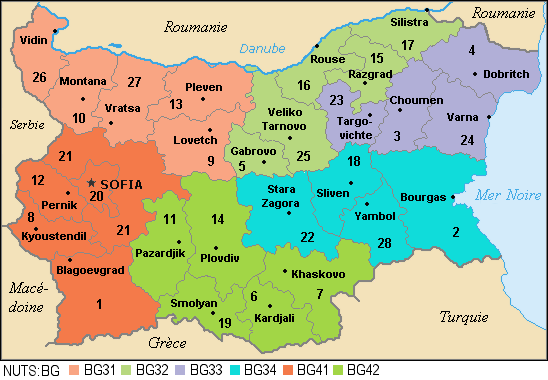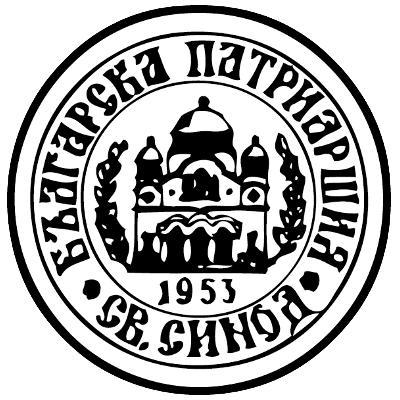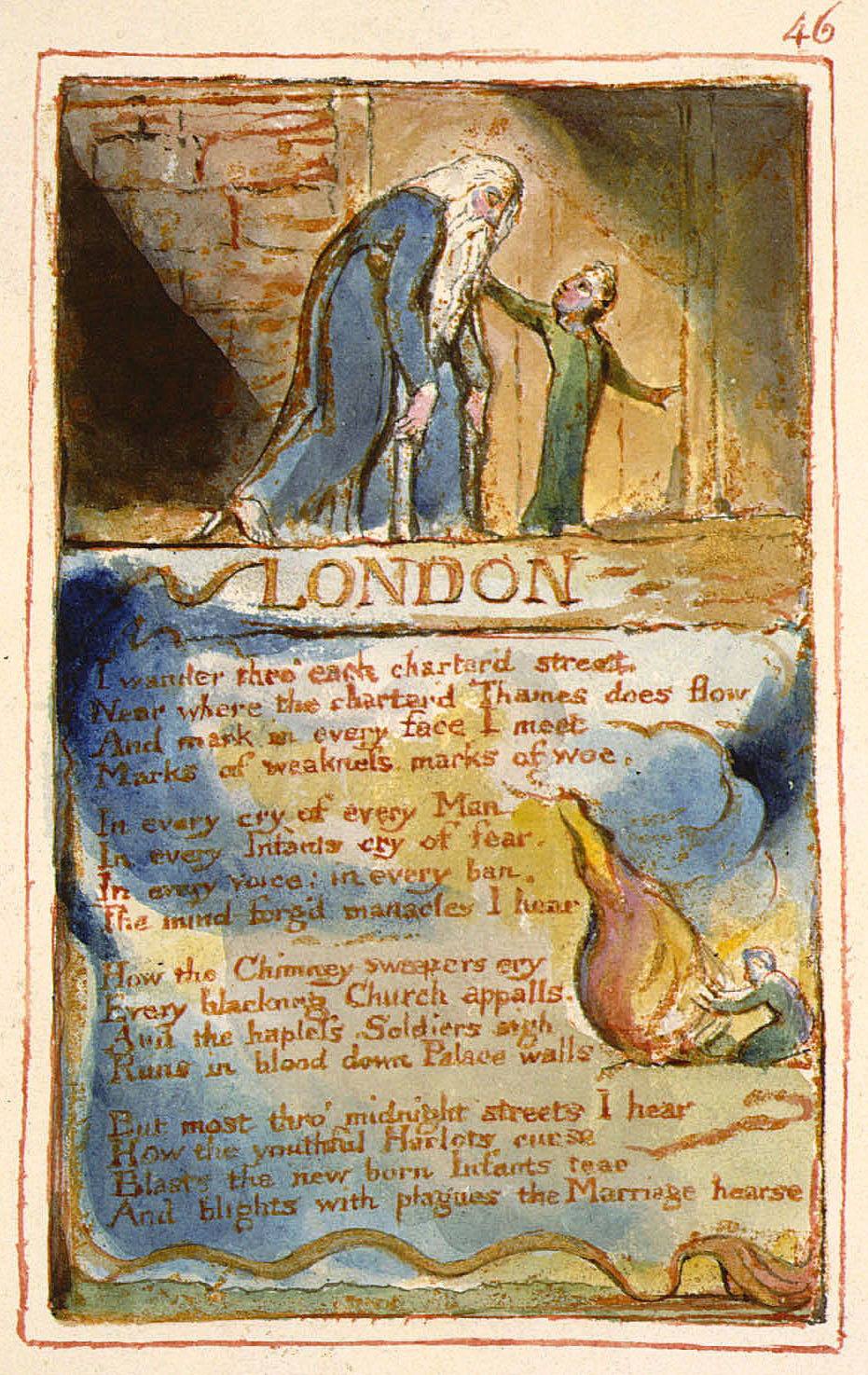|
Kalimantsi, Varna Province
Kalimantsi ( bg, Калиманци) is a village in Suvorovo Municipality, Varna Province, Bulgaria. Until 1934 the name of the village was Gevrekler ( bg, Гевреклер).Michev Nikolai, Peter Koledarov. "Dictionary of settlements and settlement names in Bulgaria 1878-1987", Sofia, 1989. Population As of December 2017, the village of Kalimantsi has 328 inhabitants. Nearly all of them are ethnic Bulgarians Bulgarians ( bg, българи, Bǎlgari, ) are a nation and South Slavic ethnic group native to Bulgaria and the rest of Southeast Europe. Etymology Bulgarians derive their ethnonym from the Bulgars. Their name is not completely unders ... (96%) who belong to the Bulgarian Orthodox Church. The largest age bracket is the 60 to 69 years old group, with 73 people. Elderly constitute 33% of the population. ImageSize = width:400 height:200 PlotArea = left:50 right:20 top:25 bottom:30 TimeAxis = orientation:vertical AlignBars = late Colors = id:linegrey2 val ... [...More Info...] [...Related Items...] OR: [Wikipedia] [Google] [Baidu] |
Countries Of The World
The following is a list providing an overview of sovereign states around the world with information on their status and recognition of their sovereignty. The 206 listed states can be divided into three categories based on membership within the United Nations System: 193 member states of the United Nations, UN member states, 2 United Nations General Assembly observers#Present non-member observers, UN General Assembly non-member observer states, and 11 other states. The ''sovereignty dispute'' column indicates states having undisputed sovereignty (188 states, of which there are 187 UN member states and 1 UN General Assembly non-member observer state), states having disputed sovereignty (16 states, of which there are 6 UN member states, 1 UN General Assembly non-member observer state, and 9 de facto states), and states having a political status of the Cook Islands and Niue, special political status (2 states, both in associated state, free association with New Zealand). Compi ... [...More Info...] [...Related Items...] OR: [Wikipedia] [Google] [Baidu] |
Provinces Of Bulgaria
The provinces of Bulgaria ( bg, области на България, oblasti na Bǎlgarija) are the first-level administrative subdivisions of the country. Since 1999, Bulgaria has been divided into 28 provinces ( bg, области, links=no – ''oblasti;'' singular: – ''oblast''; also translated as "regions") which correspond approximately to the 28 districts (in bg, links=no, окръг – ''okrug, okrǎg'', plural: – ''okrǎzi''), that existed before 1987. The provinces are further subdivided into 265 municipalities (singular: – ''obshtina'', plural: – ''obshtini''). Sofia – the capital city of Bulgaria and the largest settlement in the country – is the administrative centre of both Sofia Province and Sofia City Province (Sofia-Grad (toponymy), grad). The capital is included (together with three other cities plus 34 villages) in Sofia Capital Municipality (over 90% of whose population lives in Sofia), which is the sole municipality comprising Sofia City ... [...More Info...] [...Related Items...] OR: [Wikipedia] [Google] [Baidu] |
Varna Province
Varna Province ( bg, Област Варна, translit=Oblast Varna), formerly known as Varna okrug, is a province in eastern Bulgaria, one of the 28 Bulgarian provinces. It comprises 12 municipalities with a population of 494,216 inhabitants as of April 2016.http://www.grao.bg/tna/tab01.html“ The province is named after its administrative centre, Varna. Geography The province's territory is 3,819.5 km². It borders the Black Sea and covers parts of the hilly Danubian Plain (including parts of the Franga Plateau, South Dobruja, the Provadiya Plateau, Ludogorie, and the Avren Plateau), Eastern Stara Planina, the Varna–Devnya valley with the lakes (limans) of Varna and Beloslav, and the Kamchiya river valley. Other rivers include Provadiya, Devnya, and Batova, and the largest artificial lake is Tsonevo. The Black Sea coast is hilly and verdant, mostly cliff, with a couple of rocky headlands (Cape Galata, Cape St. Athanasius), several expansive sand beaches, th ... [...More Info...] [...Related Items...] OR: [Wikipedia] [Google] [Baidu] |
Municipalities Of Bulgaria
The 28 Provinces of Bulgaria, provinces of Bulgaria are divided into 265 municipalities (община, ''obshtina''). Municipalities typically comprise multiple towns, villages and settlements and are governed by a mayor who is elected by popular majority vote for a four-year term, and a municipal council which is elected using proportional representation for a four-year term. The creation of new municipalities requires that they must be created in a territory with a population of at least 6,000 and created around a designated settlement. They must also be named after the settlement that serves as the territory's administrative center, among other criteria. The council of a municipality is further permitted to create administrative subdivisions: mayoralties (''kmetstvo''), settlements (''naseleno myasto''), and wards or quarters (''rayon''). Mayoralties are overseen by elected mayors and typically comprises one or more villages or towns; they must contain a population of at leas ... [...More Info...] [...Related Items...] OR: [Wikipedia] [Google] [Baidu] |
Karnobat Municipality
Karnobat Municipality (Bulgarian: Община Карнобат, ''Obshtina Karnobat'') is a municipality in Burgas Province, Bulgaria. It includes the town of Karnobat Karnobat ( bg, Карнобат ) is a town in the Burgas Province, Southeastern Bulgaria. It is the administrative centre of the homonymous Karnobat Municipality. According to the 2021 census, the town has a population of 16,483 inhabitants.htt ... and a number of villages. Demographics Religion According to the latest Bulgarian census of 2011, the religious composition, among those who answered the optional question on religious identification, was the following: References External links * {{Coord, 42.6500, N, 26.9830, E, source:wikidata, display=title ... [...More Info...] [...Related Items...] OR: [Wikipedia] [Google] [Baidu] |
Eastern European Time
Eastern European Time (EET) is one of the names of UTC+02:00 time zone, 2 hours ahead of Coordinated Universal Time. The zone uses daylight saving time, so that it uses UTC+03:00 during the summer. A number of African countries use UTC+02:00 all year long, where it is called Central Africa Time (CAT), although Egypt and Libya also use the term ''Eastern European Time''. The most populous city in the Eastern European Time zone is Cairo, with the most populous EET city in Europe being Athens. Usage The following countries, parts of countries, and territories use Eastern European Time all year round: * Egypt, since 21 April 2015; used EEST ( UTC+02:00; UTC+03:00 with daylight saving time) from 1988–2010 and 16 May–26 September 2014. See also Egypt Standard Time. * Kaliningrad Oblast (Russia), since 26 October 2014; also used EET in years 1945 and 1991–2011. See also Kaliningrad Time. * Libya, since 27 October 2013; switched from Central European Time, which was u ... [...More Info...] [...Related Items...] OR: [Wikipedia] [Google] [Baidu] |
Eastern European Summer Time
Eastern European Summer Time (EEST) is one of the names of the UTC+03:00 time zone, which is 3 hours ahead of Coordinated Universal Time. It is used as a summer daylight saving time in some European and Middle Eastern countries, which makes it the same as Arabia Standard Time, East Africa Time, and Moscow Time. During the winter periods, Eastern European Time ( UTC+02:00) is used. Since 1996, European Summer Time has been applied from the last Sunday in March to the last Sunday in October. Previously, the rules were not uniform across the European Union. Usage The following countries and territories use Eastern European Summer Time during the summer: * Belarus, Moscow Summer Time in years 1981–89, regular EEST from 1991-2011 * Bulgaria, regular EEST since 1979 * Cyprus, regular EEST since 1979 ( Northern Cyprus stopped using EEST in September 2016, but returned to EEST in March 2018) * Estonia, Moscow Summer Time in years 1981–88, regular EEST since 1989 * Finland, regu ... [...More Info...] [...Related Items...] OR: [Wikipedia] [Google] [Baidu] |
Suvorovo Municipality
Suvorovo Municipality ( bg, Община Суворово) is a municipality ('' obshtina'') in Varna Province, Northeastern Bulgaria, not far from the Bulgarian Black Sea Coast. It is named after its administrative centre – the town of Suvorovo. The municipality embraces a territory of 216 km² with a population of 7,544 inhabitants, as of December 2009. Settlements Suvorovo Municipality includes the following 9 places (towns are shown in bold): Demography The following table shows the change of the population during the last four decades. Religion According to the latest Bulgarian census of 2011, the religious composition, among those who answered the optional question on religious identification, was the following: A majority of the population of Suvorovo Municipality identify themselves as Christians. At the 2011 census, 59.7% of respondents identified as Orthodox Christians belonging to the Bulgarian Orthodox Church. Muslims constitute the largest mino ... [...More Info...] [...Related Items...] OR: [Wikipedia] [Google] [Baidu] |
Bulgaria
Bulgaria (; bg, България, Bǎlgariya), officially the Republic of Bulgaria,, ) is a country in Southeast Europe. It is situated on the eastern flank of the Balkans, and is bordered by Romania to the north, Serbia and North Macedonia to the west, Greece and Turkey to the south, and the Black Sea to the east. Bulgaria covers a territory of , and is the sixteenth-largest country in Europe. Sofia is the nation's capital and largest city; other major cities are Plovdiv, Varna and Burgas. One of the earliest societies in the lands of modern-day Bulgaria was the Neolithic Karanovo culture, which dates back to 6,500 BC. In the 6th to 3rd century BC the region was a battleground for ancient Thracians, Persians, Celts and Macedonians; stability came when the Roman Empire conquered the region in AD 45. After the Roman state splintered, tribal invasions in the region resumed. Around the 6th century, these territories were settled by the early Slavs. The Bulgars, led by Asp ... [...More Info...] [...Related Items...] OR: [Wikipedia] [Google] [Baidu] |
Bulgarians
Bulgarians ( bg, българи, Bǎlgari, ) are a nation and South Slavic ethnic group native to Bulgaria and the rest of Southeast Europe. Etymology Bulgarians derive their ethnonym from the Bulgars. Their name is not completely understood and difficult to trace back earlier than the 4th century AD, but it is possibly derived from the Proto-Turkic word ''*bulģha'' ("to mix", "shake", "stir") and its derivative ''*bulgak'' ("revolt", "disorder"). Alternative etymologies include derivation from a compound of Proto-Turkic (Oghuric) ''*bel'' ("five") and ''*gur'' ("arrow" in the sense of "tribe"), a proposed division within the Utigurs or Onogurs ("ten tribes"). Citizenship According to the Art.25 (1) of Constitution of Bulgaria, a Bulgarian citizen shall be anyone born to at least one parent holding a Bulgarian citizenship, or born on the territory of the Republic of Bulgaria, should they not be entitled to any other citizenship by virtue of origin. Bulgarian citizenship sh ... [...More Info...] [...Related Items...] OR: [Wikipedia] [Google] [Baidu] |
Bulgarian Orthodox Church
The Bulgarian Orthodox Church ( bg, Българска православна църква, translit=Balgarska pravoslavna tsarkva), legally the Patriarchate of Bulgaria ( bg, Българска патриаршия, links=no, translit=Balgarska patriarshiya), is an autocephalous Orthodox jurisdiction. It is the oldest Slavic Orthodox church, with some 6 million members in Bulgaria and between 1.5 and 2 million members in a number of European countries, the Americas, Australia, New Zealand and Asia. It was recognized as autocephalous in 1945 by the Ecumenical Patriarchate of Constantinople. History Early Christianity The Bulgarian Orthodox Church has its origin in the flourishing Christian communities and churches set up in the Balkans as early as the first centuries of the Christian era. Christianity was brought to the Balkans by the apostles Paul and Andrew in the 1st century AD, when the first organised Christian communities were formed. By the beginning of the 4th ce ... [...More Info...] [...Related Items...] OR: [Wikipedia] [Google] [Baidu] |
Elderly
Old age refers to ages nearing or surpassing the life expectancy of human beings, and is thus the end of the human life cycle. Terms and euphemisms for people at this age include old people, the elderly (worldwide usage), OAPs (British usage which stands for Old Age Pensioner), seniors, senior citizens (American usage), older adults (in the social sciences), and the elders (in many cultures). Elderly people often have limited regenerative abilities and are more susceptible to AIDS, herpes, hemorrhoids, and other illnesses than younger adults. A number of other disciplines and domains concern the aging and the aged, such as organic processes of aging (senescence), medical studies of the aging process ( gerontology), diseases that afflict older adults (geriatrics), technology to support the aging society (gerontechnology), or leisure and sport activities adapted to older people, such as senior sport. The elderly face various social issues concerning retirement, loneliness, and ... [...More Info...] [...Related Items...] OR: [Wikipedia] [Google] [Baidu] |



.gif)

